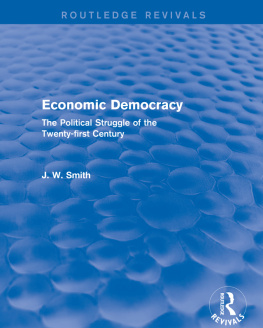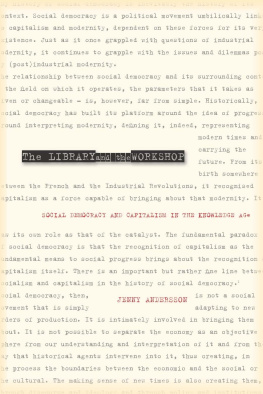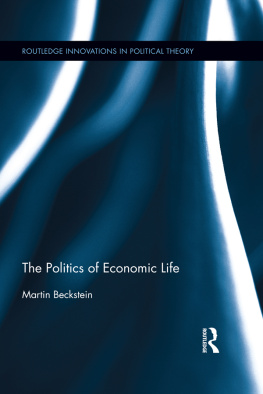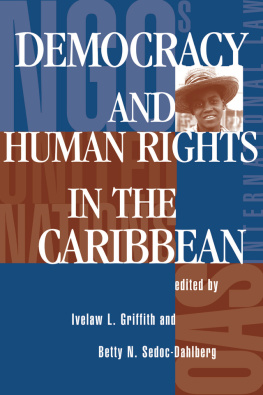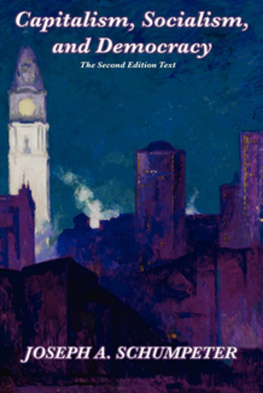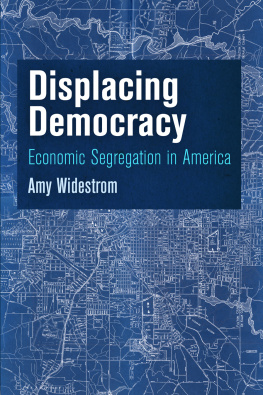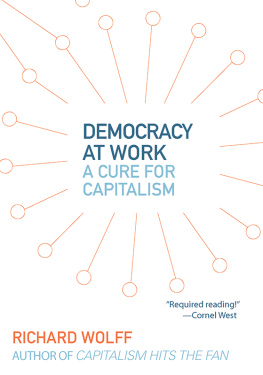ECONOMIC DEMOCRACY
Economic Democracy
The Political Struggle of the Twenty-first Century
J.W. Smith
First published 2000 by M.E. Sharpe
Reissued 2018 by Routledge
2 Park Square, Milton Park, Abingdon, Oxon OX14 4RN
711 Third Avenue, New York, NY 10017, USA
Routledge is an imprint of the Taylor & Francis Group, an informa business
Copyright 2000 by Institute for Economic Democracy
No part of this book may be reprinted or reproduced or utilised in any form or by any electronic, mechanical, or other means, now known or hereafter invented, including photocopying and recording, or in any information storage or retrieval system, without permission in writing from the publishers.
Notices
No responsibility is assumed by the publisher for any injury and/or damage to persons or property as a matter of products liability, negligence or otherwise, or from any use of operation of any methods, products, instructions or ideas contained in the material herein.
Practitioners and researchers must always rely on their own experience and knowledge in evaluating and using any information, methods, compounds, or experiments described herein. In using such information or methods they should be mindful of their own safety and the safety of others, including parties for whom they have a professional responsibility.
Product or corporate names may be trademarks or registered trademarks, and are used only for identification and explanation without intent to infringe.
Publisher's Note
The publisher has gone to great lengths to ensure the quality of this reprint but points out that some imperfections in the original copies may be apparent.
Disclaimer
The publisher has made every effort to trace copyright holders and welcomes correspondence from those they have been unable to contact.
A Library of Congress record exists under LC control number: 99016254
ISBN 13: 978-1-138-89544-7 (hbk)
ISBN 13: 978-1-138-89540-9 (pbk)
ISBN 13: 978-1-315-50141-3 (ebk)
At the pivotal point of each age, scholarship comes forward that becomes the defining template of the age to come. This is such a work of scholarship. It is a work that explains the creation of today's world, both its marvels and its violence and misery. Fortunately, it does not leave us with that analysis; it goes on to define what must be done in the future so we all may enjoy the fruits and comforts provided by the social productive capacity that is the property of us all.
History is written by the conquerors but there have always been the intellectual dissenters who have shaken the edifice erected by power and wealth. Jean Jacques Rousseau, Friedrich List, and Karl Marx were such voices, as were America's Thorstein Veblen and Henry George. At times these voices were muffled by the drumbeat of the cheerleaders for the dominant ideological explanation of reality. But, as Dr. Smith demonstrates, these unapproved philosophies are reexamined as each crisis returns to shatter our security and faith in the orthodox explanations.
Smith examines the economic basis of the history of Imperial Civilization. His examination of the precursor configuration of society just prior to the advent of the Industrial Revolution reveals the configuration that is with us even now. Cities of the Middle Ages monopolized the means of production to themselves and conquered and controlled the source of raw materials and the markets in the countryside. Through financial, technological, and military power, allied imperial centers of capital control the present world, their countryside, by the same methods and for the same reasons. Smith laboriously outlines the changing verbal coloration of this chameleon through each age and documents that its configuration has not changed.
This serious academic study documents in detail the strategies and techniques whereby a small part of the world's population consumes the majority of the world's resources.
Fewer than 500 people now have more wealth than more than half of the earth's population. This is an astounding condition. That this is only known by scholars who study obscure statistics of economics attests to what Smith documents: the intense monopolization of all structures of modern society, especially information, by those who own the bulk of it.
The masses of society have straggled for centuries to establish the rights that some of us now enjoy. Labor rights, political rights, women's rights, and human rights are now a popular item of interest in all countries, even though control of society by the masses is waning. Instructively, in the United States, through the sleight of hand of the money that finances politics, political control has incrementally moved toward the one-half of one percent of the population whose wealth in 1995 roughly equaled that of the lower 90 percent of society.
Those same people have guided the removal of political control from the level of the voters to more and more rarefied levels, ultimately to what Smith refers to as the IMF/World Bank/GATT/NAFTA/WTO/MAI/military colossus. As he describes, this is the legal and policing framework of a functioning, worldwide, corporate-controlled empire.
The value of Smith's scholarship is that he not only reveals the heretofore unrecognized forces that have created the present world, but he goes beyond that to paint a clear and concise picture of the future world. In a world in which we are told there is scarcity and therefore poverty, Smith documents the fact that only part of the money spent on military and economic warfare since the close of World War II could have developed the entire presently "underdeveloped world." In a time in which those who inhale the world's wealth for speculation, military hardware, and economic warfare tell us there is no money for human needs, Smith documents there is an abundance of money and lays out specific and reasonable plans for providing for the world's human needs. Simply stated, one of the great values of this work is that it demonstrates in reasonable terms that there are real and legitimate solutions to the problems of housing, food, environment, and peace.
All students who read this work will understand that the world does have a future. There are reasonable solutions. The way that those solutions will be achieved is that the people of the earth will take control of their collective destiny and that the activities of society will be directed toward our common goal of the care of all of human society and the earth. Thus, Smith brings into focus the urgent fact that economic democracy must be the next claim of the world's masses, in order to create full human rights and to institute policies beneficial to the collective destiny rather than profit and power for a few.
William H. Ktke
Author, The Final Empire
This treatise, like all knowledge and accomplishments, is the result of many people's thoughts and efforts. My special thanks go to the hundreds of authors and reporters who each had a special window on the world, knew that what they viewed was of importance, and had the talent and courage to express it. Their work was the hard part, and, in comparison, synthesizing their clear views of reality into a broad picture of the world economic and political landscape was easy.
Special thanks go to M.E. Sharpe, their senior editor Sean M. Culhane, his assistant Esther Clark, and copy editor Barbara Chamberlain. William H. Kotke, author of the impressive Final Empire, took the pressure off the final manuscript preparation and his forthcoming books are something we will be watching for. Ralph McGehee and his twelve-megabyte database on sources were indispensable. The support of the many friends at the San Luis Obispo Unitarian Church, especially William and Ann Furtick, is greatly appreciated. Mr. Petru Dumitriu, United Nations Permanent Mission for Romania, provided important support.

